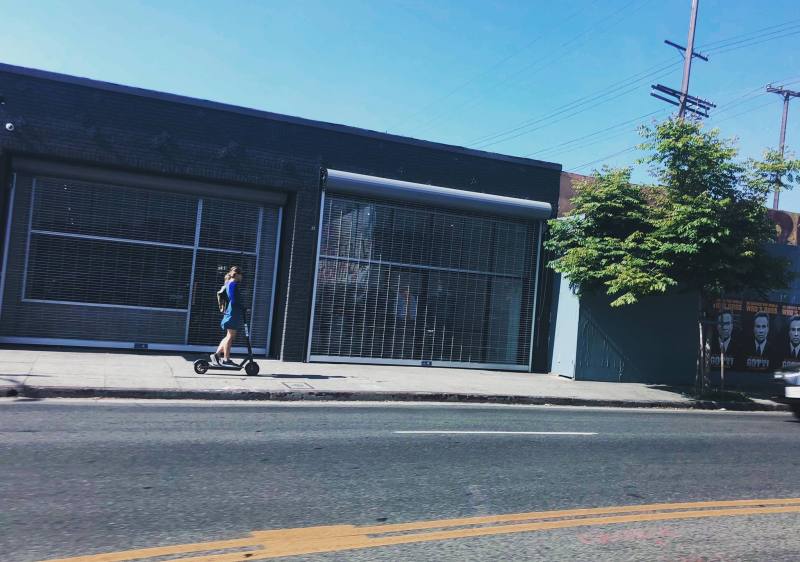This afternoon, the Los Angeles City Council Public Works Committee approved proposed regulations that would apply to dockless shared mobility devices, including e-scooters, e-bikes, and bike-share.
The most contentious issue at hand is e-scooters, which have seen extensive deployment, use, and backlash, especially in Westside areas. In case readers haven't kept score, here's a brief recap of recent scooter developments.
Outside the city of L.A.: Beverly Hills and West Hollywood have temporarily banned e-scooters. Santa Monica city staff were going to tightly limit them, but their city council disagreed. Staff recommended Uber and Lyft to run a new e-scooters pilot that would effectively ban Bird and Lime, who shut down for a day to protest and rally.
For the city of Los Angeles: City Councilmember Paul Koretz, jumping on a bandwagon launched by councilmember Mitch Englander, called for temporarily banning e-scooters. L.A. issued a cease-and-desist to keep Bird e-scooters out of downtown. Meanwhile, the city's Transportation Department (LADOT) and the council's Transportation Committee have been hammering out regulations that would apply to various shared devices: e-scooters, e-bikes, dockless bike-share, and whatever similarly shared stuff comes along next. Last week, the Transportation Committee added a few updates to shared device regulations it had approved in July. The committee's updated rules would limit e-scooters to 12 mph - roughly the speed of a beach cruiser - and would set up 120-day temporary permits that would apply to companies already operating in advance of the new regulations.
The Public Works committee kicked off by hearing from Koretz, who urged a ban because, in his opinion, the e-scooter business model fails when laws are enforced, especially helmet requirements and sidewalk riding prohibitions.
The actual committee - councilmembers Bob Blumenfied, Joe Buscaino, Nury Martinez, David Ryu, and Monica Rodriguez - were much more welcoming of dockless shared mobility devices, though with some caveats.
The committee approved the regulations with the following modifications:
- Speed Limit: Public Works favored a 15 mph speed limit, not the 12 mph limit approved by Transportation Committee. According to committee testimony, Bird currently self-regulates its scooters at 15 mph, while Lime scooters go up to 20 mph. The committee requested report-backs to use data to allow the council to set future speed limits, and to explore the possibility of GPS-based variable speed limits that might differ depending on where the scooter is being operated.
- Open Conditional Use Permits: LADOT had proposed (and T-Committee approved) straightforward 120-day conditional-use permits for companies currently operating devices. The permits would expire when the new regulations kick in. Councilmember Ryu pointed out that this way of permitting would privilege companies that have broken rules by operating now, and disadvantage companies that are waiting for city regulations. The committee opened up the conditional permits to all companies, with companies not already operating allowed to permit a 1,500 device fleet respecting existing operations boundaries (ie: not downtown - yet).
- Report Back on Funding Street Improvements: With Bird funding street improvements, including protected bike lanes, Blumenfield expressed interest in getting company funding to help build out L.A.'s bicycle networks. LADOT General Manager Seleta Reynolds responded affirmatively, though she clarified that funding was not always the limiting factor in the city building safer streets.
- Report Back on Liability: Blumenfield expressed a great deal of concern over future lawsuits against the city. Though any operating permits include indemnification of the city, there is still concern that device riders may hit potholes, then sue the city. Blumenfield proposed that some percentage of permit fees be set aside as a liability fund.
- Report Back on Leaving Devices Upright: Councilmember Ryu requested that companies develop and install technology that ensures that all trips end with the device upright. The time frame is not clear for this, so LADOT will work with companies to come up with an appropriate one.
- Report Back on Parking Areas: There was a great deal of support for developing designated parking areas for devices - along the lines of bike corrals. Though this sounds doable and can address some clutter, it tends to runs counter to the flexibility of dockless devices to require a dock. Long Beach and other cities are experimenting with drop zones. LADOT will work with companies to explore designated parking areas.
- Report Back on Incentivizing Good Behavior: LADOT's shared mobility lead Marcel Porras stressed that the department is looking to get companies to act in their own interest by acting as the first line of defense against issues of broken and incorrectly-parked devices. The committee is looking to mandate promising practices. LADOT will report back on this, too.
The proposal will next go to the full council, which will need to reconcile the 12mph vs. 15 mph speed limit question.






